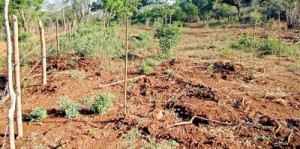News
Green groups celebrate rare win against commerce
Environmentalists often have to fight losing battles but they have recently won a battle against a company clearing a forest where elephant, leopard and bear roam in order to grow gliricidia, a biofuel crop.

The land being cleared in Amarawewa
The problem emerged in 2012, when environmentalists noted a large area of forest being cleared in Amarawewa, part of the Tissamaharama Forest Range adjoining the Yala National Park.
The Amarawewa scrub forest, which is under the Forest Department, is a diverse habitat used by a number of animals. As it is close to Yala National Park Block I its disruption has also had an impact on Sri Lanka’s most popular national park.
The Environmental Foundation Limited (EFL) which fights legal battles to stop environmental damage, was shocked when its investigators found that as much as 1500 hectares of forest were being cleared.
The work was being carried out by United Dendro Energy Pvt. Ltd, a subsidiary of Lanka Orix Leasing Company (LOLC). The company planned to bring gliricidia stakes to be processed at the Dendro Power Plant being set up at Biyagama.
Further investigations by environmentalists revealed the existence of two agreements now found by the courts to be unlawful.
One was the grant of an annual permit by the Divisional Forest Office of Hambantota releasing 500ha of the Amarawewa forest to an organisation called Magampura Cattle Owned Farmers Association to develop as pasture land.
The other was a tripartite agreement with the Forest Department, United Dendro Energy Pvt Ltd and the Magampura Cattle Owned Farmers Association according to which 1500ha were to be developed as pasture land while the annual permit granted to the Magampura Cattle Owned Farmers Association only allowed for 500ha.
The 2012 investigations also revealed that several areas approximating 100ha had already been cleared and planted with gliricidia and that access roads were being cut through the buffer zone for the Yala National Park.
The EFL went quickly into action to stop further destruction.
Along with the Wildlife and Nature Protection Society (WNPS) and Wilderness and Protected Areas Foundation (WPAF) the EFL went to court seeking justice. The organisations filed a fundamental rights application in the Supreme Court.
They claimed the project violated the National Environment Act (NEA), the Forest Ordinance (FO) and the Flora and Fauna Protection Ordinance (FFPO).
The NEA states that any project that involves the clearing of more than 1ha of forest, and plantation of any type exceeding 5ha, needed an Environmental Impact Assessment to be conducted priorto any approvals.
The FO clearly specifies that “no person shall cut or clear any forest for the purpose of cultivation and/or pasture land” without a permit that cannot be granted absent due process.
Part of the land that was cleared falls within a mile of the border of the Ruhuna National Park, which is declared as a Protected Area under the provisions of the FFPO.
Any development project falling within one mile of a national park boundary requires the approval of the wildlife department.
Furthermore, the FFPO also makes it mandatory for a party seeking such approval to conduct an Environmental Impact Assessment and submit the report to the wildlife department as a project approving agency.
In Amarawewa, the Dendro project cleared a large extent of forest lands inviolation of all these covenants, lawyers fighting the case pointed out.
In August, United Dendro agreed to settle the case by abandoning the project and also removing the gliricidia that had been cultivated. According to the settlement terms, the related permits too will be cancelled.
The agreement further states that the area should not be released for a similar project in the future.
| Pluses for farmers, big minus for wildlife The plan to annex forest habitat for commercial cultivation was shrewd and, on its face, reasonable. The agreement granting villagers the right to run cattle on 500ha of forest was the foot in the door. A provision that allowed them to grow and cut fodder for the animals was the enabling factor that allowed United Dendro Energy Pvt. Ltd to plant its biofuel cash crop, gliricidia. Gliricidia, a fast-growing medium-sized tree, apart from its commercial value as biofuel, is useful to farmers because its leaves provide food for grazing animals, generate powerful natural fertiliser and “green manure” and can also be used as insect repellent. With its quick growth, gliricidia can be cut back frequently, and at Amarawewa the leaves could have been used by local farmers with the branches and trunk trimmings being harvested for biofuel. All this would have come at a heavy cost for wildlife, which would have seen their diverse habitat freely providing a variety of foods and needs transformed into monocultural habitat locked for human use, and the forest corridors that allow them to move around in search of food severely constricted. |

